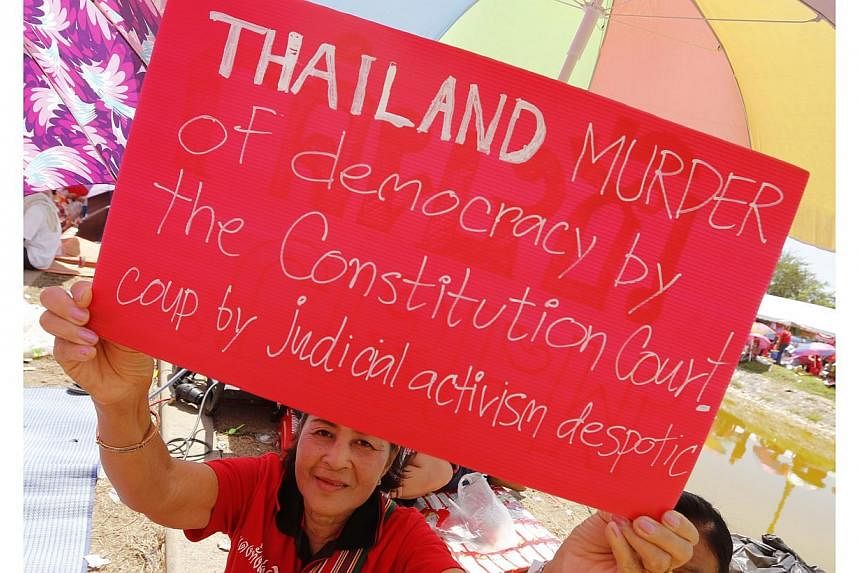BANGKOK (REUTERS) - Six months of political turmoil has created Thailand's biggest ever crisis, the leader of the country's Senate said on Monday, amid calls from anti-government protesters for a new interim prime minister after Ms Yingluck Shinawatra was ousted last week.
Newly elected Senate Speaker Surachai Liengboonlertchai called a special session on Monday, hoping to draw up a plan to end the crisis.
"At this moment, the Senate is the main institution that can solve Thailand's political crisis... Thailand is facing its biggest crisis right now," Mr Surachai told reporters.
"We will discuss how to draw up a road map to get Thailand out of this situation.
"A neutral prime minister has not yet been discussed as part of the road map," Mr Surachai said.
Protest leader Suthep Thaugsuban, a former deputy Prime Minister in a government run by the pro-establishment Democrat Party, has called on the Senate, the judiciary and Election Commission to step in and appoint a new prime minister.
Ms Yingluck's caretaker government has remained in office since the Constitutional Court ordered her and nine cabinet colleagues to step down over a nepotism case. The caretaker government is hoping to organise a July election that it would likely win.
But the protesters say the entire administration has lost legitimacy and want to replace it with a "neutral" interim prime minister who would oversee electoral reforms aimed at keeping Ms Yingluck and her brother, ousted former Prime Minister Thaksin Shinawatra, out of power.
Thaksin, a former telecommunications tycoon, was overthrown in a coup in 2006. He won huge support in the north and northeast with his pro-poor policies, but was increasingly seen as a challenge to the Bangkok-based royalist establishment.
The latest phase of a nearly decade-long struggle between Thaksin and the establishment has damaged South-east Asia's second-biggest economy and has even raised fear of civil war. The military, which has intervened frequently in politics in the past, has stayed out this time despite calls from some pro-establishment forces for it to oust the pro-Thaksin government.
"Military heads have never mentioned a neutral prime minister and this is not something they plan to get involved in," Mr Winthai Suvaree, a spokesman for the army, told Reuters, referring to the anti-government protesters' demand. "The military is not planning to stage a coup and it will let politicians sort the country's problems out."
Thailand has seen nine military coups since 1946, when King Bhumibol Adulyadej assumed the throne. The king, who is 86, has intervened to defuse previous crises but has not commented directly since this one blew up.
Derided by his opponents as a corrupt crony capitalist who manipulates elections with his wealth, Thaksin - the last prime minister to be deposed by the army - lives in self-exile abroad to avoid a 2008 jail sentence for graft.
Ms Yingluck dissolved the lower house of parliament in December to call an election she hoped would end the protests. But her opponents disrupted the vote and it was later ruled void. She and the Election Commission have agreed on July 20 for a new election but it has not been formally called.
Rival supporters are staging sit-in protests at various places in and on the outskirts of Bangkok, raising fears of violence. Twenty-five people have been killed in sporadic violence since this round of protests kicked off in November. Rallying pro-government "red shirt" activists are demanding a new election.
"Appointing a so-called neutral, un-elected prime minister is against the law and, I warn you, it will provoke a violent reaction," red shirt leader Jatuporn Prompan told Reuters. "Thai people know their rights - they are now politically savvy and will not accept a puppet premier chosen by the elite."
Ms Yingluck's ruling Puea Thai Party selected Commerce Minister Niwatthamrong Boonsongphaisan as caretaker prime minister last week, but government opponents reject his appointment.
Anti-government protesters on Monday moved from a city park to a site in front of the UN regional headquarters to prepare for what they see as imminent victory. "For those joining our final offensive be prepared to stay until we prevail," Mr Suthep told his supporters on Sunday night.
STRAITS TIMES GRAPHIC

